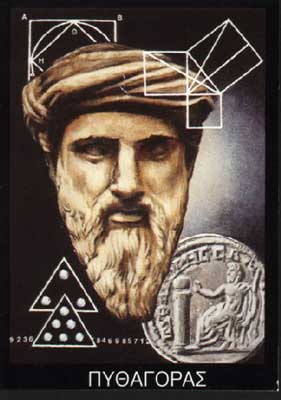A Brief History of Absolute MusicThough my intentions are not to oversimplify the complex and intricate background in philosophy, history, and musical theory that these topics are rooted in, a summarized history is necessary to get a backdrop onto how the creation and comparison of the two came to be. I admit that my summary barely scrapes the surface on the enigma behind and between absolute and program music occurred. There have been many texts illustrating the philosophical discourse on the subject.A Brief History (part one)
|
 Pythagoras
Pythagoras
Pythagoras is credited with the foundation of the basics of music, organizing tones and chords into those that are used today. These take the form of consonance and dissonance, or pleasant and unpleasant tones. The concept of octaves, fifths and fourths arose from these arrangements. (Gamwelll, 150) Pythagoras, enthralled that he saw a universe of numbers sorrounding him, assigned different tones to the movement of planets. He theorized that the movements of planets created a celestial harmony through the combination of chords and tones. He called this the "harmony of the spheres." Though no written documents or records of the Pythagoreans on this matter has survived the ages, Ptolemy summarizes his theories in his book Harmonics. Ptolemy ends his book with the admiration of Pythagoras' view that music is the link between the microcosm and the macrocosm, between the human soul and the cosmos. It was in the concept of idealism, grounded in Pythagorean philosophy, that the Romantic aesthetic of absolute music was really able to flourish. To put it bluntly, idealism gives priority to spirit over matter. "From an aesthetic standpoint, idealism holds that art and the external world are consonant with one another, not because art imitates that world, but because both reflect a common, higher ideal." (Music as Thought, Bonds, pg. 12) |
 Johannes Kepler
Johannes Kepler
Johannes Kepler was influenced by Pythagoras' harmony of the spheres. Kepler found that there was a constant ratio between the radius of a planet's orbit and the time it takes to orbit the sun, calling it the "harmonic law." Kepler believed that his law had further discovered the idea of cosmic music. There were differences between Kepler's conception of the celestial tones and the Pythagorean idea. Pythagoras believed that planetary orbits were circular and travelled at constant speed. Under this system of belief, each planet would produce only one note. Kepler's achievements in astronomy dictated that:
 Kepler's Interpretation of the "Harmony of the Sphere's (Gamwell, 150) Once Rene Descartes and Isaac Newton came along with their experiments in light, it was found the musical notes could be expressed in color. The idea, however odd as it may seem, is not all that far fetched. Both music and color are products of sound and light. Sound and light are both formed by waves. So theoretically, music by itself really could sort of paint a picture.  Issac Newton's Color Wheel (Gamwell, 151) |
 Johannes Kepler
Johannes Kepler
During the 16th century, the growing change arising out of the schism in the church was havig adverse effects for music. Instead of music being seen in the classical way as a venue to the harmony of the universe, it was being discarded as meaning-absent tone. Some ascetic groups of followers even banned music from church services. Music was encountering conflict in both the Reformation and counter-reformation. (Edwards, 4) Music no longer carried the enchanted purpose as being a link between humans and the divine, the hallowed Word of God had replaced it in many churches around Europe. There was no enchanted element recognized in music. Tones were no longer used as entities of their own, but only to complement holy passages and songs. Music was forced to yield to words for the purpose of worship. (Bonds, 10) This was the main factor that brought about the division of music. The disintegration of music as a language on its own was brought about by the radical pursuit of rationalization by secular religious groups. Music was now incarcerated by and bound to language, to words. Music was now only meant to represent and complement words. Next |